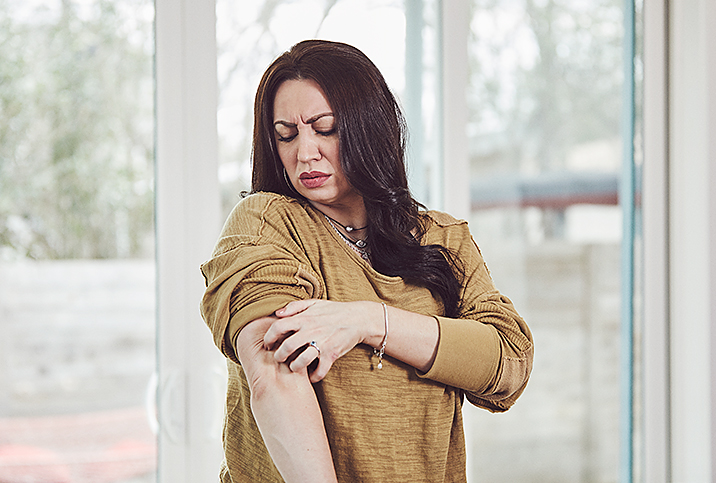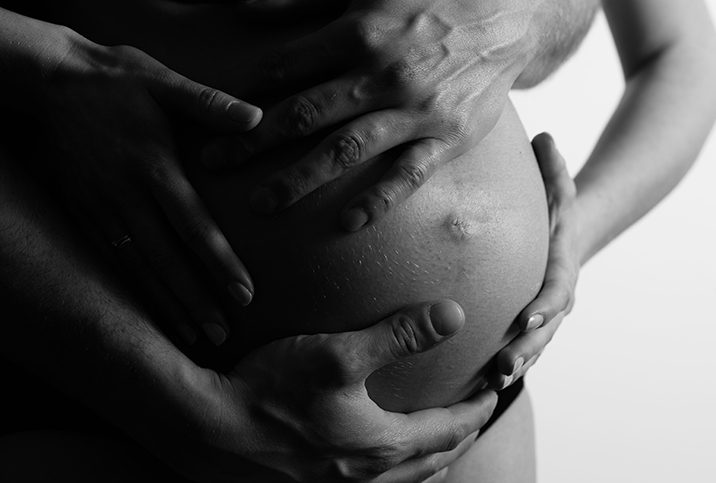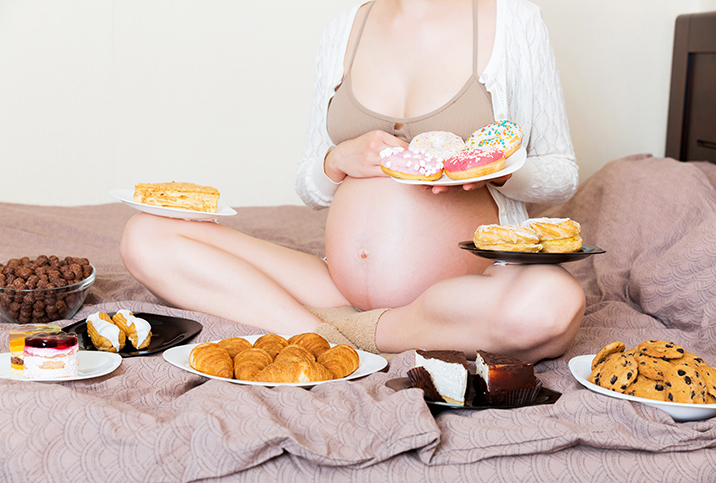Help! I'm Pregnant and I'm Itchy

As a pregnant person, you're inherently dealing with a whole host of annoying symptoms, such as morning sickness, swollen feet, back pain and more—but some women also experience intense itchiness. What gives? It may be cholestasis, a rare condition that affects between 1 percent and 5 percent of pregnancies and typically presents in the third trimester.
Intrahepatic cholestasis of pregnancy (ICP) "is usually noticed as severe itching that develops during pregnancy without the presence of a rash," said Greg Marchand, M.D., F.A.C.O.G., and a board-certified OB-GYN.
Cholestasis is the reduction or full stop of bile flow from the liver, according to Betsy Greenleaf, D.O., F.A.C.O.G. Bile, a digestive enzyme, is made in the liver and travels through ducts stored in the gallbladder, a little bag-like structure. When needed for digestion, the gallbladder will squeeze the bile into ducts that drain in the intestines to aid digestion. If the liver enzymes are elevated, it can present as intense itching.
"The cause of developing intrahepatic cholestasis during pregnancy is unclear, but it is thought to be due to rising pregnancy hormones or simply genetics," said Brynna Connor, M.D.
Whatever the reason for ICP, the symptoms can range from uncomfortable to dangerous. While itching without a rash is the primary symptom, others include:
- Dark urine
- Fatigue
- Nausea
- Decreased appetite
- Jaundice
Additionally, while the itching is typically focused in the hands and feet, some women experience it throughout their body.
Preventing cholestasis in pregnancy
There are treatments for cholestasis, but the best way to protect yourself against the discomfort is to try to prevent it in the first place.
"Prevention should be focused on a healthy lifestyle, such as avoiding inflammatory foods such as processed foods, sugar, dairy, fatty foods and processed meats," Greenleaf said. "Concentrate on staying well-hydrated and eating lean proteins, vegetables and fruits."
Greenleaf also advises women stay away from endocrine disruptors, chemicals found in fertilizers, insecticides and plastics. They can trick your body into perceiving higher estrogen levels because they bind to estrogen receptors more than natural estrogens. Some studies say endocrine disruptors can possibly contribute to cholestasis, so it is recommended to eat organic foods and avoid drinking from plastic bottles.
Even with those suggestions, there is no surefire way to prevent cholestasis, as every person is different and reacts to foods and environmental factors differently.
Cholestasis complications
Marchand said obstetricians take ICP very seriously because of the increased risk of stillbirth.
"This will usually mean close monitoring of the pregnancy, with monitoring weekly or maybe even more often toward the end of the pregnancy," he said. "Obstetricians also usually will deliver a pregnant woman a little earlier to further reduce the chance of stillbirth."
The ICP Support website says while 10 percent of women with severe ICP experience stillbirth, there are a few additional complications associated with ICP:
- Baby passing meconium (fecal matter) before birth
- Spontaneous premature birth
- Admission to the neonatal unit
"Individuals risk scratching the skin from the intense itching, thus causing a secondary bacterial infection," Greenleaf added. "Cholestasis can also affect the absorption of fat-soluble vitamins."
Connor echoed what Greenleaf said about vitamin absorption, saying the lack of absorption could lead to a vitamin deficiency because the bile from your liver is meant to travel to your intestines and help digest fats. If a person continues to poorly absorb some of these nutrients, such as calcium and vitamin D, bone tissue will eventually be lost.
These complications are also fairly likely to return in future pregnancies, with a more than 80 percent chance women will experience cholestasis again.
Treatments for cholestasis
The Liver Foundation explains some possible treatments for ICP, with the first one being Ursodeoxycholic Acid (UDCA), which is also known as Actigall or Ursodiol.
"UDCA is a naturally occurring bile acid that improves liver function and may help reduce total bile acid concentration in the bloodstream," states the Liver Foundation's website. "A recent trial was unable to show an improvement in a composite clinical outcome with the use of this medication, but it may still have some benefit in some cases and is still recommended."
The other treatment, which is less of a treatment and more of an action, is to time the delivery of the baby and alter the delivery recommendations based on bile acid levels (risk increases as bile acids become more elevated), according to the Liver Foundation website.
Am I at risk?
According to the Liver Foundation, there are certain groups of people who are at a higher risk of cholestasis during pregnancy than others. Higher risk groups include:
- Women carrying multiples
- Women who have had IVF treatment
- Women who have had previous liver damage or issues
In the United States, ICP is more common in Latina women, and there's a higher prevalence of the condition in Indigenous American women.
If you think you're at risk of cholestasis during pregnancy, get regular checkups and consult your doctor during pregnancy to keep an eye on your health and the baby's health.


















